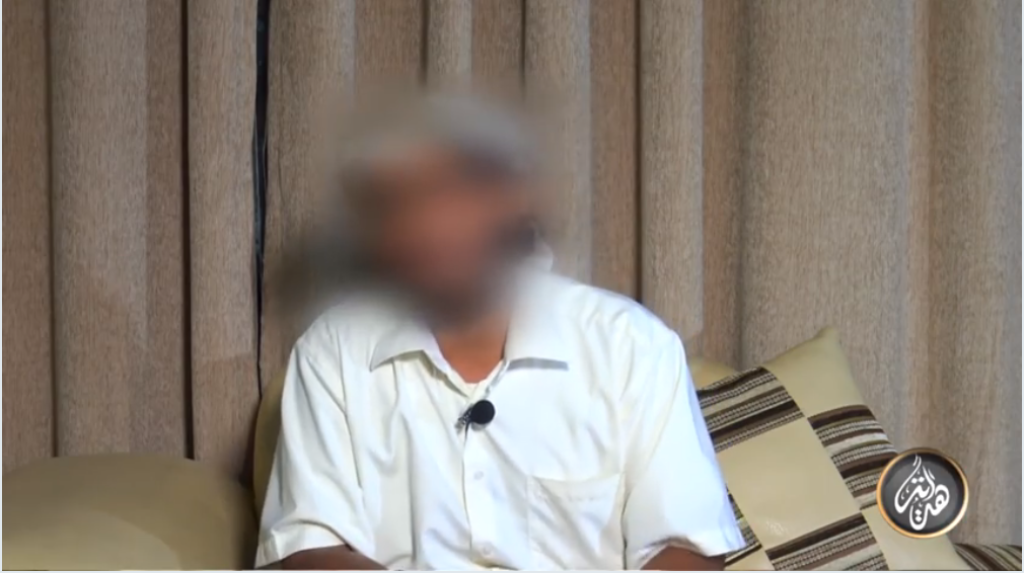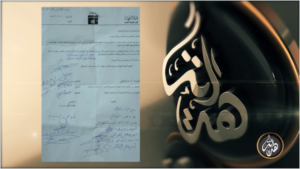
A jihadist media outfit has released a video and a statement allegedly documenting al Qaeda in the Arabian Peninsula’s (AQAP) attempts to debate Abu Bakr al Baghdadi’s men in Yemen.
The video, which is nearly 13 minutes long, was released via social media by the Hidayah Establishment for Media Production on Apr. 8. Hidayah is an al Qaeda and AQAP group that regularly releases anti-Islamic State productions and statements.
A man known as Abu al Abbas al Hadrami (seen above) discusses at length AQAP’s attempts to engage the Islamic State. Hadrami, whose face is obscured as he talks, says that jihadist ideologues wanted to “clarify matters” for the youth after the dispute with the Islamic State began.
According to Hadrami, AQAP’s Harith bin Ghazi al Nadhari and Ibrahim al Rubaish (an ex-Guantanamo detainee) were among the sheikhs who wanted to resolve the disagreements via a “public” debate. This “exposed” Nadhari and Rubaish to “danger,” but they supposedly pressed forward anyway, so that the people could “distinguish truth from falsehood.” Both Nadhari and Rubaish were killed in US drone strikes in 2015.
AQAP sent representatives to meet with the Islamic State’s arm in the Shabwah Province. The video includes footage of the two sides sitting together in a mosque and agreeing to a public debate. But the Islamic State was allegedly evasive, making “excuses” for delaying the verbal confrontation. Baghdadi’s followers eventually demanded a message from Nasir al Wuhayshi, an al Qaeda veteran who led AQAP until his demise in June 2015.

A document written by Wuhayshi is then displayed. A screen shot of the one-page missive can be seen on the right. Wuhayshi addressed “our brothers” in the Islamic State, saying the letter was his response to their request for a message concerning a debate over the disputed “points.” According to a translation obtained by The Long War Journal, Wuhayshi identified AQAP’s “delegate” as Abu Abas al Muhajir and the mediator as Abu Ali al Awlaqi, who would arrange for the debate to take place.
The debate never took place. Hadrami says one reason is that, unlike AQAP, the Islamic State doesn’t have recognizable sharia (Islamic law) scholars capable of engaging in the discourse. Hadrami claims the only officials who are known to speak for the group on such matters are Baghdadi and Islamic State spokesman Abu Muhammad al Adnani. (The Islamic State does have other sharia officials, but most of them are not as widely known within jihadist circles as al Qaeda’s.)
Hadrami decries the division in the jihadists’ ranks, saying it is a gift to the Shiites and the “Crusaders.” He adds that a public debate is needed not only in Yemen, but also in Iraq and the Levant. Still, the Islamic State won’t show up because its leaders supposedly fear “embarrassment.”
On Apr. 10, two days after Hadrami’s video was released, Hidayah posted a statement by another jihadist identified as Yaqub al Somali. His nom de guerre implies that he is from Somalia, but sometimes jihadists choose aliases for other reasons.
Somali elaborated on Hadrami’s claims, saying that the Islamic State does not dare expose the “deficiency” of its sharia officials. Baghdadi’s men have not responded to the “books” and other “publications” from al Qaeda’s “branches” that invalidate their “caliphate.”
According to a translation obtained by The Long War Journal, Somali claims that the Islamic State has failed to officially respond to Ayman al Zawahiri’s Islamic Spring video series, Harith al Nadhari’s work, the “joint statement” issued Ansar al Sharia (a front for AQAP) and Al Qaeda in the Islamic Maghreb, the books published by al Qaeda’s sharia officials in Syria, and other publications “sanctioned by al Qaeda from around the world.”
Baghdadi’s state has not provided a “valid answer” to Zawahiri’s “invalidation of their caliphate,” Somali says. Instead, the “caliphate” has “resorted to disparaging” al Qaeda’s emir Somali refers to Zawahiri as the “wise man of the ummah,” a common nickname used by al Qaeda operatives for their emir.
Somali says that the Islamic State’s global expansion has led to “disastrous” infighting everywhere from Libya to South Asia. The only exception, according to Somali, is in the Sinai.
The video starring Hadrami and the statement by Somali are propaganda, but they are an additional examples of al Qaeda’s ongoing campaign against the Islamic State. Since 2014, al Qaeda and allied groups have released anti-Islamic State messages targeting jihadists in Afghanistan, Pakistan, Syria, Yemen, across Africa, as well as elsewhere. Baghdadi’s organization similarly produces anti-al Qaeda messages on a regular basis, including even in its English-language magazine Dabiq.
Hadrami’s testimony is similar to the videos released by Al Nusrah Front, al Qaeda’s official branch in Syria, shortly after al Qaeda’s senior leadership disowned the Islamic State in early 2014. Al Nusrah introduced veterans such as Abu Firas al Suri, Abu Hammam al Suri and Abu Sulayman al Muhajir, none of whom were known to be al Qaeda leaders until they were introduced as anti-Islamic State witnesses. (Abu Firas was killed in an airstrike earlier this month. Abu Hammam may have been as well, but his death hasn’t been confirmed yet.)
Unlike the al Qaeda veterans promoted by Al Nusrah, neither Hadrami nor Somali is identified as a senior figure in the group. However, a number of signatures are included at the bottom of Wuhayshi’s letter, and some of these men are likely influential jihadists. AQAP has a deep bench of leaders from which it can draw. After losing several top officials last year, AQAP quickly introduced new public spokesmen.
According to several officials contacted by The Long War Journal, some in the US intelligence community argued in 2014 and 2015 that AQAP would defect to Baghdadi’s ranks if Wuhayshi was killed. The theory was not based on any actual evidence and was quickly disproved after Wuhayshi was killed in a US drone strike. Qasim al Raymi, Wuhayshi’s successor, reaffirmed his loyalty to Ayman al Zawahiri in short order. And Hidayah’s latest video demonstrates that AQAP continues to resist the Islamic State’s expansion in Yemen.








2 Comments
AQAP DEBATE BETWEEN THE ISLAMIC-STATE OR AL-QAEDA MIXED LOYALTIES.
A debate between these two organizations (terror groups) would be an absurd spectacle of who are the heretics and who aren’t. The ideologue has been transformed and obliterated across a range of radicalised diaspora; whose warped concepts of Islamic interpretation have created such a mass of complexity, even they cant explain it, no wonder they want to debate it…. for the understanding of the youth, of course…